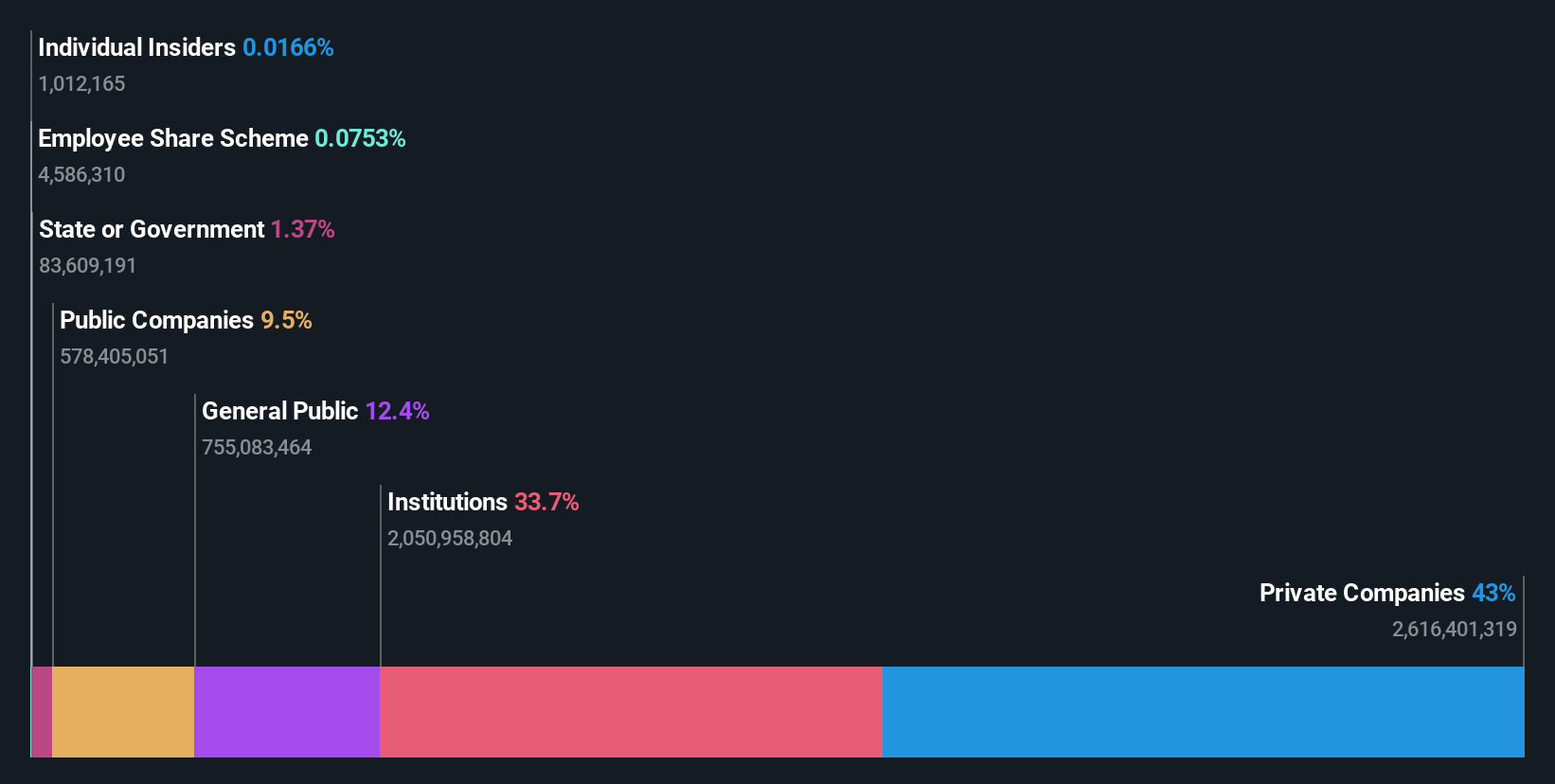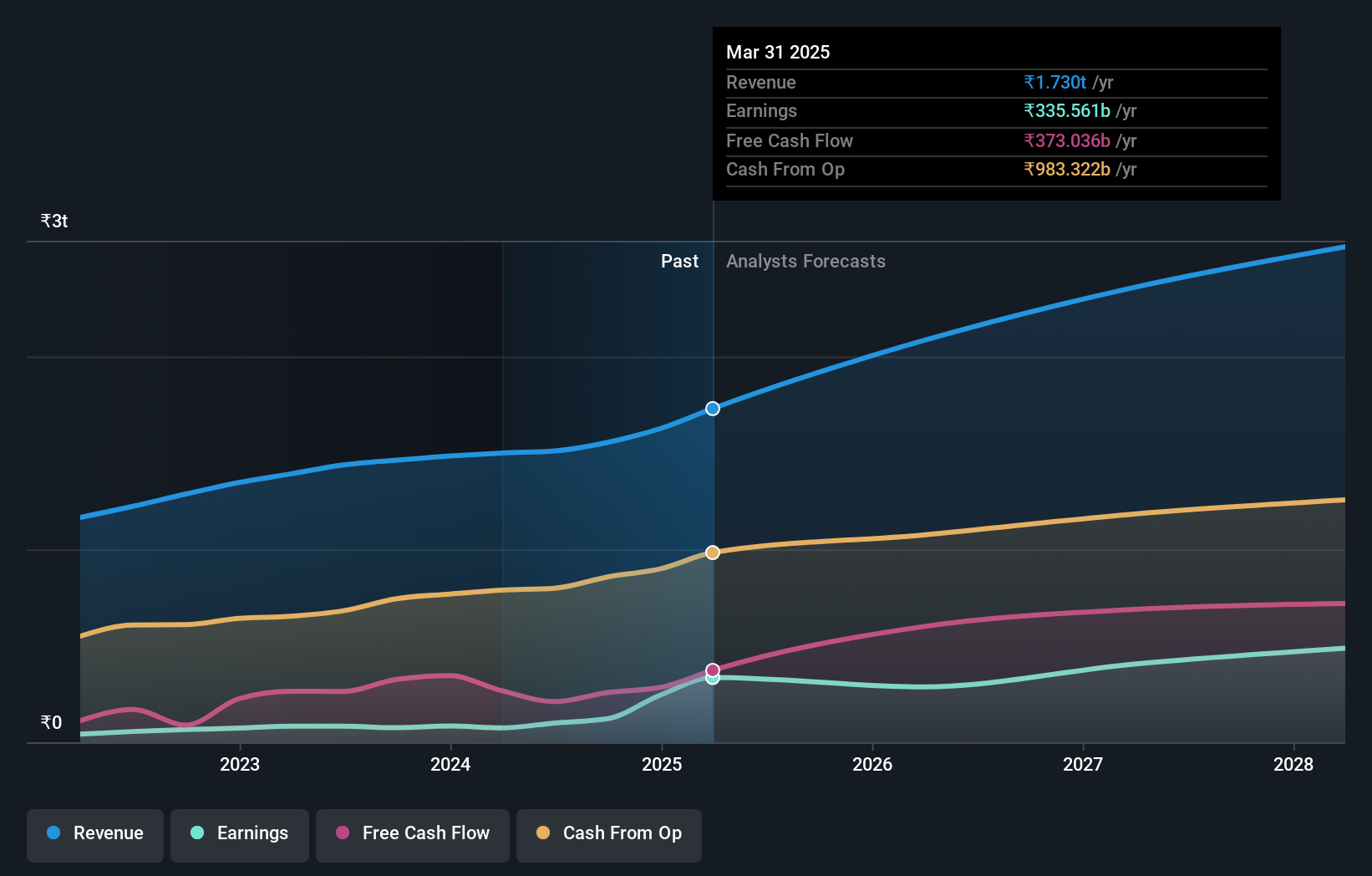- India
- /
- Wireless Telecom
- /
- NSEI:BHARTIARTL
Bharti Airtel Limited's (NSE:BHARTIARTL) largest shareholders are private companies with 43% ownership, institutions own 34%
Key Insights
- Bharti Airtel's significant private companies ownership suggests that the key decisions are influenced by shareholders from the larger public
- The top 3 shareholders own 53% of the company
- Institutions own 34% of Bharti Airtel
To get a sense of who is truly in control of Bharti Airtel Limited (NSE:BHARTIARTL), it is important to understand the ownership structure of the business. With 43% stake, private companies possess the maximum shares in the company. In other words, the group stands to gain the most (or lose the most) from their investment into the company.
Institutions, on the other hand, account for 34% of the company's stockholders. Insiders often own a large chunk of younger, smaller, companies while huge companies tend to have institutions as shareholders.
In the chart below, we zoom in on the different ownership groups of Bharti Airtel.
View our latest analysis for Bharti Airtel

What Does The Institutional Ownership Tell Us About Bharti Airtel?
Institutions typically measure themselves against a benchmark when reporting to their own investors, so they often become more enthusiastic about a stock once it's included in a major index. We would expect most companies to have some institutions on the register, especially if they are growing.
Bharti Airtel already has institutions on the share registry. Indeed, they own a respectable stake in the company. This suggests some credibility amongst professional investors. But we can't rely on that fact alone since institutions make bad investments sometimes, just like everyone does. When multiple institutions own a stock, there's always a risk that they are in a 'crowded trade'. When such a trade goes wrong, multiple parties may compete to sell stock fast. This risk is higher in a company without a history of growth. You can see Bharti Airtel's historic earnings and revenue below, but keep in mind there's always more to the story.

Hedge funds don't have many shares in Bharti Airtel. Looking at our data, we can see that the largest shareholder is Bharti Enterprises (Holding) Private Limited with 40% of shares outstanding. In comparison, the second and third largest shareholders hold about 8.3% and 4.3% of the stock.
To make our study more interesting, we found that the top 3 shareholders have a majority ownership in the company, meaning that they are powerful enough to influence the decisions of the company.
While it makes sense to study institutional ownership data for a company, it also makes sense to study analyst sentiments to know which way the wind is blowing. There are plenty of analysts covering the stock, so it might be worth seeing what they are forecasting, too.
Insider Ownership Of Bharti Airtel
The definition of an insider can differ slightly between different countries, but members of the board of directors always count. The company management answer to the board and the latter should represent the interests of shareholders. Notably, sometimes top-level managers are on the board themselves.
I generally consider insider ownership to be a good thing. However, on some occasions it makes it more difficult for other shareholders to hold the board accountable for decisions.
Our most recent data indicates that insiders own less than 1% of Bharti Airtel Limited. We do note, however, it is possible insiders have an indirect interest through a private company or other corporate structure. Being so large, we would not expect insiders to own a large proportion of the stock. Collectively, they own ₹1.9b of stock. It is always good to see at least some insider ownership, but it might be worth checking if those insiders have been selling.
General Public Ownership
With a 12% ownership, the general public, mostly comprising of individual investors, have some degree of sway over Bharti Airtel. This size of ownership, while considerable, may not be enough to change company policy if the decision is not in sync with other large shareholders.
Private Company Ownership
It seems that Private Companies own 43%, of the Bharti Airtel stock. Private companies may be related parties. Sometimes insiders have an interest in a public company through a holding in a private company, rather than in their own capacity as an individual. While it's hard to draw any broad stroke conclusions, it is worth noting as an area for further research.
Public Company Ownership
Public companies currently own 9.5% of Bharti Airtel stock. It's hard to say for sure but this suggests they have entwined business interests. This might be a strategic stake, so it's worth watching this space for changes in ownership.
Next Steps:
It's always worth thinking about the different groups who own shares in a company. But to understand Bharti Airtel better, we need to consider many other factors. Consider for instance, the ever-present spectre of investment risk. We've identified 3 warning signs with Bharti Airtel (at least 1 which is a bit concerning) , and understanding them should be part of your investment process.
If you are like me, you may want to think about whether this company will grow or shrink. Luckily, you can check this free report showing analyst forecasts for its future.
NB: Figures in this article are calculated using data from the last twelve months, which refer to the 12-month period ending on the last date of the month the financial statement is dated. This may not be consistent with full year annual report figures.
Valuation is complex, but we're here to simplify it.
Discover if Bharti Airtel might be undervalued or overvalued with our detailed analysis, featuring fair value estimates, potential risks, dividends, insider trades, and its financial condition.
Access Free AnalysisHave feedback on this article? Concerned about the content? Get in touch with us directly. Alternatively, email editorial-team (at) simplywallst.com.
This article by Simply Wall St is general in nature. We provide commentary based on historical data and analyst forecasts only using an unbiased methodology and our articles are not intended to be financial advice. It does not constitute a recommendation to buy or sell any stock, and does not take account of your objectives, or your financial situation. We aim to bring you long-term focused analysis driven by fundamental data. Note that our analysis may not factor in the latest price-sensitive company announcements or qualitative material. Simply Wall St has no position in any stocks mentioned.
About NSEI:BHARTIARTL
Bharti Airtel
Operates as a telecommunications company in India and internationally.
Outstanding track record average dividend payer.
Similar Companies
Market Insights
Community Narratives



